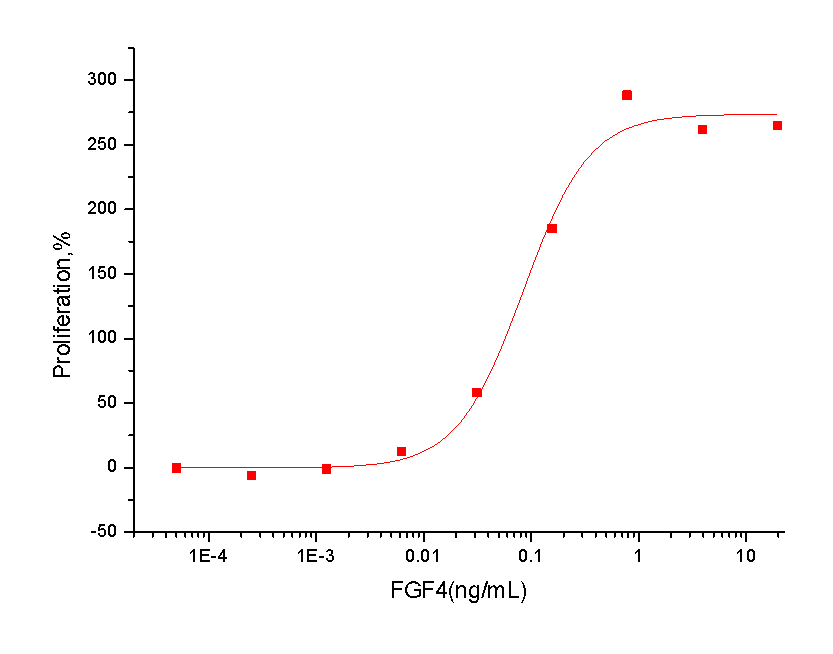- 全部删除
 您的购物车当前为空
您的购物车当前为空
FGF-4 Protein, Human, Recombinant
FGF (fibroblast growth factor) signalling is known to be required for many aspects of mesoderm formation and patterning during Xenopus development and has been implicated in regulating genes required for the specification of both blood and skeletal muscle lineages. Fibroblast growth factor 4 (FGF4) signaling induces differentiation from embryonic stem cells (ESCs) via the phosphorylation of downstream molecules such as mitogen-activated protein kinase/extracellular signal-related kinase (MEK) and extracellular signal-related kinase 1/2 (ERK1/2). Fibroblast Growth Factor 4 (FGF-4) could not only increase the proliferation of bone marrow mesenchymal stem cells (BMSCs), but also induce BMSCs into hepatocyte-like cells in vitro. FGF4 transduced BMSCs contributed to liver regeneration might by the transplanted microenvironment. The FGF4-bFGF BMSCs thus can enhance the survival of the transplanted cells, diminish myocardial fibrosis, promote myocardial angiogenesis, and improve cardiac functions.

FGF-4 Protein, Human, Recombinant
| 规格 | 价格 | 库存 | 数量 |
|---|---|---|---|
| 20 μg | ¥ 875 | 现货 | |
| 100 μg | ¥ 2,930 | 5日内发货 | |
| 200 μg | ¥ 5,190 | 5日内发货 |
产品信息
| 生物活性 | Measured in a cell proliferation assay using Balb/c 3T3 mouse fibroblasts. The ED50 for this effect is typically 0.04-0.2 ng/mL.  |
| 产品描述 | FGF (fibroblast growth factor) signalling is known to be required for many aspects of mesoderm formation and patterning during Xenopus development and has been implicated in regulating genes required for the specification of both blood and skeletal muscle lineages. Fibroblast growth factor 4 (FGF4) signaling induces differentiation from embryonic stem cells (ESCs) via the phosphorylation of downstream molecules such as mitogen-activated protein kinase/extracellular signal-related kinase (MEK) and extracellular signal-related kinase 1/2 (ERK1/2). Fibroblast Growth Factor 4 (FGF-4) could not only increase the proliferation of bone marrow mesenchymal stem cells (BMSCs), but also induce BMSCs into hepatocyte-like cells in vitro. FGF4 transduced BMSCs contributed to liver regeneration might by the transplanted microenvironment. The FGF4-bFGF BMSCs thus can enhance the survival of the transplanted cells, diminish myocardial fibrosis, promote myocardial angiogenesis, and improve cardiac functions. |
| 种属 | Human |
| 表达系统 | E. coli |
| 标签 | Tag Free |
| 蛋白编号 | P08620 |
| 别名 | K-FGF,KFGF,HSTF1,HST-1,HST,HBGF-4,fibroblast growth factor 4 |
| 蛋白构建 | A DNA sequence encoding the human FGF4 (NP_001998.1) (Ser54-Leu206) was expressed. Predicted N terminal: Met |
| 蛋白纯度 | ≥ 95 % as determined by SDS-PAGE. ≥ 95 % as determined by SEC-HPLC.  |
| 分子量 | 16.92 kDa (predicted) |
| 内毒素 | < 10 EU/mg of the protein. |
| 缓冲液 | Lyophilized from a solution filtered through a 0.22 μm filter, containing PBS, pH 7.4. Typically, a mixture containing 5% to 8% trehalose, mannitol, and 0.01% Tween 80 is incorporated as a protective agent before lyophilization. |
| 复溶方法 | A Certificate of Analysis (CoA) containing reconstitution instructions is included with the products. Please refer to the CoA for detailed information. |
| 存储 | It is recommended to store recombinant proteins at -20°C to -80°C for future use. Lyophilized powders can be stably stored for over 12 months, while liquid products can be stored for 6-12 months at -80°C. For reconstituted protein solutions, the solution can be stored at -20°C to -80°C for at least 3 months. Please avoid multiple freeze-thaw cycles and store products in aliquots. |
| 运输方式 | In general, Lyophilized powders are shipping with blue ice. |
| 研究背景 | FGF (fibroblast growth factor) signalling is known to be required for many aspects of mesoderm formation and patterning during Xenopus development and has been implicated in regulating genes required for the specification of both blood and skeletal muscle lineages. Fibroblast growth factor 4 (FGF4) signaling induces differentiation from embryonic stem cells (ESCs) via the phosphorylation of downstream molecules such as mitogen-activated protein kinase/extracellular signal-related kinase (MEK) and extracellular signal-related kinase 1/2 (ERK1/2). Fibroblast Growth Factor 4 (FGF-4) could not only increase the proliferation of bone marrow mesenchymal stem cells (BMSCs), but also induce BMSCs into hepatocyte-like cells in vitro. FGF4 transduced BMSCs contributed to liver regeneration might by the transplanted microenvironment. The FGF4-bFGF BMSCs thus can enhance the survival of the transplanted cells, diminish myocardial fibrosis, promote myocardial angiogenesis, and improve cardiac functions. |




